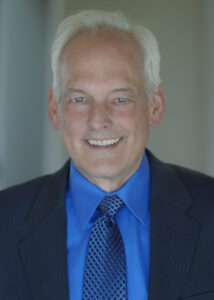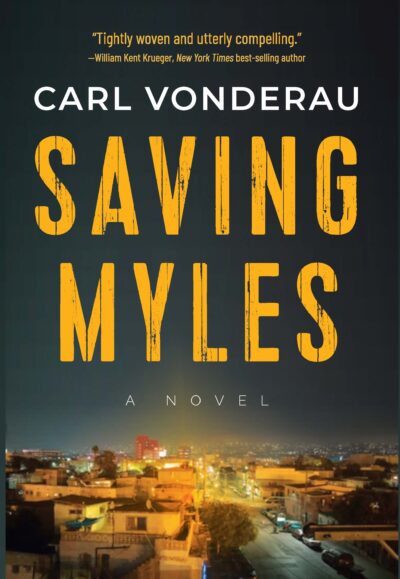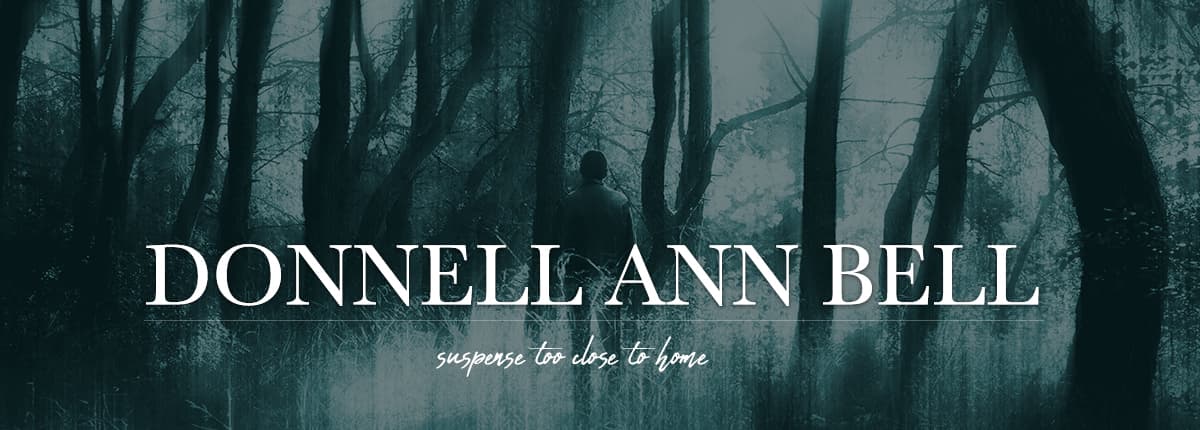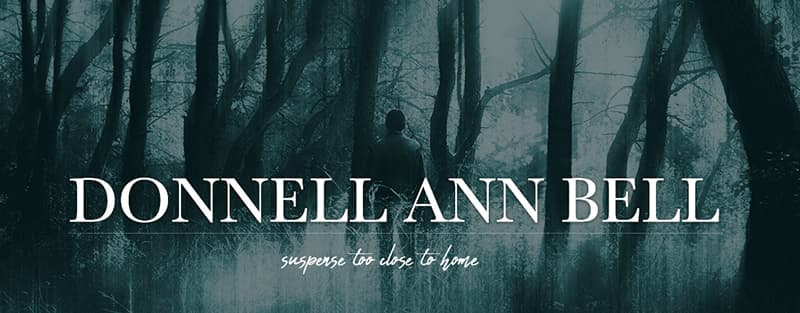Interview with Carl Vonderau, Author of Saving Myles
 Welcome to Interview Alley, my spinoff page to Help From My Friends Friday. Today’s guest is the award-winning Carl Vonderau, a fellow mystery writer and chaptermate of Sisters in Crime Colorado. After reading Saving Myles, I can attest Mr. Vonderau knows the meaning of the word Thriller. His storytelling is visceral, his plot told from a unique perspective not many can emulate. A well-written, explosive story filled with so much tension and realism, it’s one of those books that’s hard to put down. ~ Donnell
Welcome to Interview Alley, my spinoff page to Help From My Friends Friday. Today’s guest is the award-winning Carl Vonderau, a fellow mystery writer and chaptermate of Sisters in Crime Colorado. After reading Saving Myles, I can attest Mr. Vonderau knows the meaning of the word Thriller. His storytelling is visceral, his plot told from a unique perspective not many can emulate. A well-written, explosive story filled with so much tension and realism, it’s one of those books that’s hard to put down. ~ Donnell
“Take a breath an hold on.” ~ New York Times best-selling author Steve Berry
“Chilling, Immersive and Utterly Heartbreaking.” ~ USA Today Best-selling Author Hank Phillippi Ryan
Donnell: Carl, thanks for being with me today. Before reading Saving Myles, I thought I was fairly knowledgeable about cartels. Particularly the way they acquire assets and how they obtain them through criminal enterprise, violence and manipulation. As a banker, you go beyond the average researcher, deeper into this world, particularly the financial end. What inspired this story?

Author Carl Vonderau
Carl Vonderau: A number of things inspired me to write Saving Myles. Ever since John Grisham’s The Firm came out, I wondered what it would be like if a crime family owned a financial institution. (Actually Pablo Escobar owned a bank in Colombia at one point.) I also wanted to include some details about money laundering. As not many thrillers involve nonprofits, I put that in too. Finally, I have lived and worked in the U.S., Montreal, and Mexico, so I brought those multicultural differences into the story.
But my overall writing motto is that behind every crime is a family. A dysfunctional family amplifies conflict and forces the characters to change.
Donnell: They may be dysfunctional but they’re also decent people raising their only son. You write that asleep the teenage Myles looks like the child they know. Awake, he is in crisis. Wade and Fiona make one of the toughest choices parents will ever make. In addition to creating a brilliant conflict for plot and making your characters suffer, why this avenue?
Carl Vonderau: I have known several people who had to send their son or daughter to a residential treatment center. A recent New York Times editorial estimated that every year more than a hundred thousand kids are sent to treatment centers and wilderness programs. For these families, the doubts about that decision clouds everything thereafter. Was it the right thing to do? Will the child ever forgive the parents for banishing them? Will the parents ever trust the child again? Did the treatment work or fail, or did it do both? In Saving Myles, these questions deeply influence how the family deals with the kidnapping and money laundering.
Donnell: What a sobering statistic. Fiona works for a nonprofit agency and passionate about its success. Wade has a thriving banking career. In addition to Myles’ problems, both Fiona and Wade’s careers intersect and create a domino effect in the story. Talk about why you chose this route, and as a writer, I’m curious, did you outline and stick with this plot, or did you change direction after several drafts?
Carl Vonderau: Wade was always a workaholic, which poisoned his relationships with his wife and his son. As the book begins, he feels guilty for not being a better husband and father. Fiona became pregnant in her early twenties and had to give up the adventures she dreamed of in order to raise Myles. She resents how little her husband helped raise him. At the same time she feels very close to Myles and has enormous guilt for not being a better parent. These pressures fracture the marriage when Myles goes off the rails. The only way that Wade and Fiona can save their son—and each other—is to come together.
I always had this idea, but how I executed it changed over many drafts. I outlined the book, but the outline kept changing. Especially because I changed the [point of views] POVs. Originally I only wrote it as Wade. When I reviewed the idea with my agent, she suggested including more POVs. You can imagine what I thought when she said that. Oh shit! The first new one I tackled was Fiona. I read lots about why women leave their spouses so that I could more realistically portray this. I also originally only had Myles’ POV at the end of the book. My writing coach suggested that I needed more than that. Developing the persona of a teenager was a challenge. Then the question was: Whose POV best evoked each scene? In some chapters I tried several POVs before choosing one.
The other thing that changed was the opening. I originally started the book with someone showing up at Wade’s door to say that his son had disappeared in Mexico. An acquisition editor asked me why the reader would care about characters they knew nothing about. I thought about Mystic River and how Dennis Lehane started that book. The first chapter portrayed something that happened twenty years before the story’s main plot. That incident forever shaped the three main characters’ lives. For my fictional family, one event illustrated the relationships of the three characters and changed their lives. That was the night Wade and Fiona had to send their son by force to a treatment center. I started the book with this. It broke most of the rules for thrillers and mysteries, but I felt the novel worked best that way.
Donnell: Congratulations on staying true to your vision. The opening ties in nicely. I must assume you’ve never dealt with a cartel. You also put your characters through living hell as a cartel weaves its sinister clutches in the most unsuspecting of ways. You bring in the FBI and DEA and make Wade a reluctant hero, not only with the cartel but when dealing with federal agencies that tie Wade’s hands in procedure. You show us the luxurious circumstances in which cartels’ families exist. However, their wealth comes at a considerable cost. What kind of research did you do to bring such realism to this story?
Carl Vonderau: I’ve had a few experiences of potential criminals wanting to work with the banks that employed me. But I never pursued them. So I wasn’t an expert on crimes in banks or money laundering. To gain that knowledge I did internet research, took courses, and talked to the FBI and DEA.
I also needed expertise on kidnapping in Mexico. Kimberly Howe’s books involve kidnapping. She, as well as the FBI and DEA, gave me much useful information. I also had an unpredictable source—the YMCA. I’d done volunteer work in San Diego and had contact with the YMCA staff in Mexico. They introduced me to a man there who’d been kidnapped and I got to talk with him. Other than that, I did a lot of reading about it.
I was not very familiar with Tijuana, where a lot of Saving Myles takes place. My friends at the Y showed me places where an abduction could occur, where the extremely wealthy lived, and where an orphanage for street kids might be. I took pictures and extensive notes. COVID prevented me from traveling to the Mexican wine country. So I studied photos and videos to render that part of the story.
Because my books involve Latin America, and because I both studied and traveled to there, I’ve followed the activities of drug cartels for many years. That gave me background into the kind of luxury that many of them live in.
Your point about the cost is excellent. I believe that many cartel families want their children to get out of crime. Therefore I gave my cartel family two principles: 1) The children must survive, and 2) The children must live better lives than they do. Who could disagree with that?
Donnell: Since you worked in the banking industry for many years, I’m curious what kind of feedback you received from your colleagues.
Carl Vonderau: I have not received much feedback from people I worked with. Those who have contacted me have liked the book.
Donnell: You have stated more than once that perfectionism is a problem. I share this ailment. What do you do to combat this, and any tips to work through it?
Carl Vonderau: It will continually be a problem. I can always think of ways the book might be better. My writer’s group also continually finds weaknesses. Thus I re-write too much. I try to give myself deadlines, but I usually slide right by them. However, once the publisher gives me a deadline I meet it. I guess the solution would be to get a two-book deal with built-in progress reports. But then the writing might not be as good.
One place where I’ve managed to overcome perfectionism is the first draft. I do this by hand and write as fast as I can. That means some parts don’t work and much needs to be filled in. When I have at least 5 pages I feel I have a scene and I can type it into the computer. While I’m doing that, I fill in things and cut others. I try not to edit too much at this point. When I look at those scenes a few weeks or months later, they almost always need extensive revision.
Donnell: Interesting, I write my drafts in Gregg shorthand. You populate Saving Myles with a diverse cast of characters, the establish myriad roadblocks to challenge Wade, Fiona, and Myles. Saving Myles is one of the most memorable books I’ve ever read, and that’s quite a compliment. What comes next for you, Carl?
Carl Vonderau: I’m doing final revisions on another book that takes place in the financial industry. This time it’s in a branch that deals more with the day-to-day public. A man mourning the death of his wife resurrects his former life by investigating the death of his close colleague.
Sounds like a banker turns sleuth! Can’t wait to read. I hope you’ll come back and blog with me again to help promote it. I got bogged down asking you about writing, but I probably should’ve mentioned that your knowledge of Mexico and California and place of setting truly shine. Also, your Canadian roots benefited the story as well. Very well done.
Readers, questions or comments for Carl?
 About Saving Myles:
About Saving Myles:
When the FBI can’t help, an unassuming banker takes matters into his own hands to bring his son home.
Wade, a respected banker in La Jolla, CA, and his estranged wife, Fiona, make the unbearable decision to send their teenage son, Myles, away to an expensive treatment center after a streak of harmful behavior. After a year of treatment, Myles comes home, seemingly rehabilitated. But soon, he sneaks off to Tijuana to buy drugs—and is kidnapped.
When the ransom call comes, Fiona is frantic and accepts help from Andre, the Quebecois whose charity Fiona runs. Wade is wary of Andre’s reputation and the bank he owns, but seeing no other way to secure a kidnap negotiator or the ransom, he swallows his doubts to get his son home.
In order to get the ransom money, Wade makes a deal with Andre—he’ll work for Andre’s bank in exchange for the cash. But as Wade races to rescue Myles before his kidnappers lose their patience, he realizes he’s wrapped up in more crime than just a kidnapping—he’s now indebted to a cartel.
About the Author:











Thank you for that great interview, Donnell. Much appreciated!
My pleasure, Carl. I’m excited about that next book. Can’t wait to see what you come up with!
Wow! This is such a great interview! Thank you, Carl and Donnell. I love this book, Carl, and applaud you for your knowledge with your research and coming up with such chilling and believable plot twists. I’m looking forward to your next book!
I agree wholeheartedly. Thanks for stopping by, Margaret!
Margaret, thank you so much for reading it and for your support!
First draft by hand? That’s impressive!!!
Marie, I think it helps the brain slow down and fixate on the plot more. Just my thoughts on the subject. 🙂
Unfortunately my third grade teacher told my mother I had the worst handwriting she’d every seen. It hasn’t improved much, so half the fun is figuring out what I wrote.
This was a fascinating interview. I’m taking Saving Myles with me on an upcoming work trip and look forward to reading it.
Or maybe not! I see it’s on pre-order. Okay, next trip, then!
Debra, hi.Saving Myles has been out for a while. In fact I just checked and it’s on special for a limited time for $1.99 on Kindle if that’s an acceptable way you read. Thanks for checking it out!
Thanks for clarifying that, Donnell. I was just about to do the same. I hope that Debra can get it.
Wonderful interview by two outstanding authors.
Thank you, George! I hope you enjoy Saving Myles.
Thanks, George. I really enjoyed doing my post with you too!